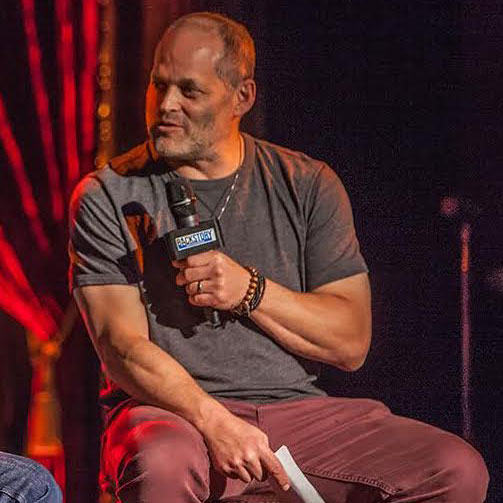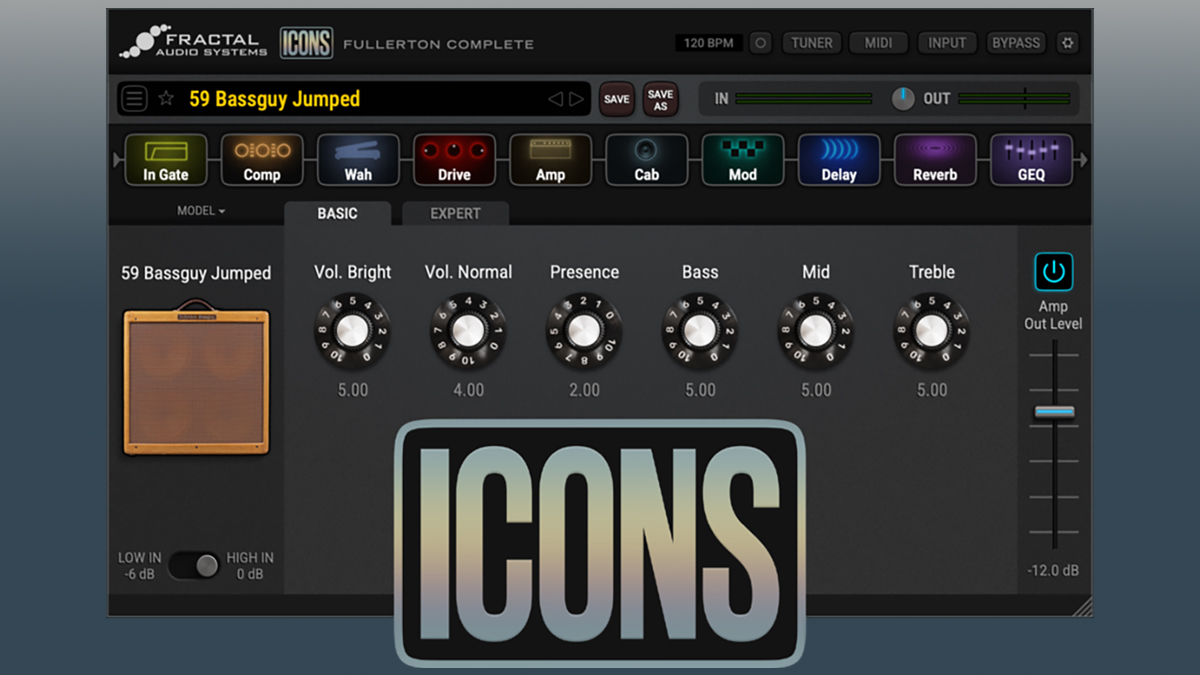All the latest guitar news, interviews, lessons, reviews, deals and more, direct to your inbox!
You are now subscribed
Your newsletter sign-up was successful

This classic interview from 1997 features Kenny Wayne Shepherd talking about his sophomore release, Trouble Is.... For our most recent interview with KWS, click here.
"When I first heard Kenny Wayne Shepherd, I thought, 'Uh-oh, another Stevie Ray Vaughan clone,'" recalls Steve Vai, who watched the young guitarist closely throughout last summer's G3 tour. "Just like the first time I heard Stevie Ray, I thought, 'Uh-oh, another Hendrix clone.' I was equally wrong both times. Kenny has the depth and insight to make what he does emotionally powerful and remove it miles from clonedom. He has that elusive 'it.' "
"He is a real talent," adds Joe Satriani. "Anyone can practice guitar, learn some licks and make believe that they're an entertainer, but to be a real natural, to be great at your instrument-to be able to walk out on any stage and immediately plug into the musicians who are playing, plug into the audience, then find your spot and be yourself-that is a real talent. And that is what Kenny has."
Shepherd's abilities are abundantly evident throughout Trouble Is..., the follow-up to his 1995 debut, Ledbetter Heights. That album-recorded while he was a high school senior in Shreveport, Louisiana-went Gold and helped make young Kenny a star. Compared to the matured Trouble Is..., Ledbetter almost seems like kid's stuff.
Shepherd's playing today is more confident, more personal and less derivative of Stevie Ray Vaughan, even though he is backed by Vaughan's former band Double Trouble-drummer Chris Layton, bassist Tommy Shannon and keyboardist Reese Wynans-on half the album. His regular touring band appears on the rest of the album, with new singer Noah Hunt handling lead vocal chores throughout. Highlights include a rollicking run through Bob Dylan's "Everything is Broken" and a great take on Jimi Hendrix's "I Don't Live Today," as well as Shepherd originals like the leadoff single "Slow Ride," the instrumental "The Trouble Is" and "Long Gone," which features blues harmonica great James Cotton.
As strong as the album is, there's no reason to think that number three won't display just as much improvement as Trouble Is.... For Shepherd is, as his friend Steve Vai says, "a work in progress."
GUITAR WORLD: This record took longer to complete than you had planned. Was the process somehow more difficult than last time?
All the latest guitar news, interviews, lessons, reviews, deals and more, direct to your inbox!
KENNY WAYNE SHEPHERD: Not at all in terms of playing, but the writing was a little tough. While I was on the road doing interviews, people kept asking me if I was feeling pressure to come up with a good second album and avoid the "sophomore slump." I was like, "What are they talking about? I don't feel any pressure at all. This is a blast." But then we came off the road to record, and I didn't really have any material because I hadn't been writing, or even thinking about it, for a year and half. You get into a road groove: you wake up, do promotion, soundcheck, have dinner, shower, get to the club, play. Then you're up real late, and you're wired, and you probably have to travel, so you get to bed early in the morning, oversleep, get up and start all over again.
I had to get out of that, to change my frame of mind from playing live to writing music. I hadn't done it in a long time and I got kind of discouraged, at first. Nothing was happening, and I didn't know where it was gonna come from. But I just kept going, and the next thing I knew I had 37 songs.
Now that you're done recording, how do you feel about the final product?
I'm really excited about everything. Working with Jerry [Harrison, producer, ex-Talking Head member who has produced Live, Big Head Todd and others-GW Ed.] has been a real pleasure. I think it's awesome, sonically-the drums and guitars sound great-but more importantly the material is really strong. I'm also excited because I sang a lot more this time, doing backup vocals on four or five songs, plus singing lead on a cut of "Voodoo Chile," which surprisingly sounds pretty decent. [laughs] Even though we decided not to put it on the album, I feel it was a big step for me.
That's a tall mountain to climb.
Yeah, but it felt good. It was awesome to have Chris and Tommy playing it. The fact that I'm singing it feels great, too, because it's a Hendrix song, and it's sort of meant for the guitar player to sing. I just couldn't see doing it with another singer; it was either I sing it or we don't cut it, so I decided to give it a go, and it felt pretty good. I was actually surprised by how good my voice sounds on it. I am probably going to start doing it every night.
It must be strange, being a star attraction who doesn't sing, as you have to turn a lot of control over to another person.
Yeah, it is a weird situation. I need to have total confidence that that person is going to do my music exactly how I want to hear it. That's part of the reason we felt we had to make a change. Noah is very talented and he has the right attitude and voice for what I want to do. I'm singing more and more myself, which is helping me become even more a part of my music. Just the fact that live I'm now singing all these background vocals, plus "Voodoo Chile," will give me so much more practice on the road than I got last year, when I hardly sang at all. I'm going to keep practicing and working on it, maybe slowly adding songs here and there. It's definitely getting better; my voice and confidence level are both eons beyond where they were when I did "Riverside" [on Ledbetter Heights].
Is it largely an issue of confidence at this point?
That's a big part of it. I was definitely a little insecure about it, because if I am going to do something, I want it to be up to the musical standards that I'm known for, and that I hold up for myself. My guitar standards are very high, and I wanted my vocals to be just as good, though I realize that it's not always like that. Look at Hendrix, Stevie Ray and Eric Clapton. They're all great singers who improved throughout their careers, but the bottom line is their singing doesn't compare to their playing, and that's why, for many years, they all played without singing. It's something they had to grow into, and I'm growing into it slowly. But I'm not going to rush it.
Working in the studio with Jerry has really helped me get to where I can just belt it out and accept the sound of my own voice, which is really difficult-especially when you hear it played back on big studio monitors where you can hear every little mistake. [laughs] But I'm getting accustomed to it.
It sounds like Jerry was really good for you, but why, considering all the success you had together, did you decide to not work again with your last producer, David Z?
David was great to work with, but I felt it was time to look in a different direction. Then I heard the Big Head Todd and the Monsters album Jerry produced for my label [Beautiful World, Revolution] and I thought it was clearly that band's best performance, so I immediately asked my A&R; guy, "Get him." I felt we would see eye to eye, musically. And I was right.
I felt that this album needed to be more aggressive, both playing-wise and in its production. It's not like I'm mad, but I feel like my playing has improved at least 90 or 100 percent from when I did the first album, and I really wanted that to come through. I wanted everyone to be able hear the emotion and dexterity that's there now, and wasn't there before. I wanted that to be in your face. There's so much more emotion in my music now.
Why do you think that is?
It's a result of doing so much touring. When you play live every night for a year and a half or two years straight, it really makes your chops a lot better. You don't notice it so much while it's happening, but you listen back and hear it. When we started touring to promote Ledbetter Heights, we did about 250 shows in a year and a half. How could you not grow from that experience?
How exactly have you improved?
Well, I really practiced my vibrato a lot, and I think it's way better. I also bend much more precisely and confidently; I hit all my notes now. Basically, my overall technique is just much better than it was. But I also think I've developed better taste and more of an understanding of when to hold back and when to let it rip and really play a lot of notes. Being on the road with guys like B.B. [King] showed me a lot. He can knock you off the stage with one note, so I tried to figure out how to do that. I think that in terms of influences, I've also gotten more into Albert King, so there's more of his licks popping up in my playing. While I was on the road, I got really deeply into Albert and Hendrix.
One well-known hazard of life on the road is substance abuse. Has working with Double Trouble, who played with Stevie Ray Vaughan and paid their own dues in this regard, helped you avoid these problems?
Definitely. I think that everyone has to have their own experiences, but you can also learn from someone else's mistakes. Stevie definitely set an example to not screw your life up over something that's just not worth it. The reason that he talked about all his problems so much and in such depth, and was so incredibly frank about them, is that when he got sober he wanted to help other people. I'm talking first-hand, from speaking with him as well as reading interviews in Guitar World and other places. I saw him five or six times right before he died and he spoke about everything real explicitly, and anything he didn't tell me I heard from Chris and Tommy. It's something you really don't want to get into as deep as he did.
Playing with Double Trouble must have been exciting for you.
There was definitely a lot of excitement there, from me and also from them. It was just really cool. We kept a lot of my original tracks from our sessions because the three of us were playing off of each other so much. I'd play a lick and Chris would accent it perfectly, and when I tried to overdub it wasn't as locked in, because when we were doing it together, there was so much intuition happening. They inspired me to play a lot of new and different stuff. Sometimes, I'd just want to see if I could turn their heads. The whole experience was definitely inspirational.
Sure. That's the band you grew up worshipping.
[laughs] Definitely. But I know those guys so well now that they are real friends. Chris and I talk on a regular basis, and I also love Tommy. So now they're more than just my idols, like they were; they're also my friends, and that's a pretty special situation. And they're a blast to play with. We wrote a lot together, and they really didn't write much with Stevie. There was a lot of jamming going on. We probably have five DAT tapes of stuff which isn't on this album. They're the best rhythm section for the kind of music I'm doing. They're the guys who pretty much created the stuff.
Together, they had such a distinct sound, especially the way they would lay a half step back on even the hardest-driving shuffles. I think that sense of restraint in Stevie's music is something you get, and which many others just miss.
Thanks. A lot of players think that Stevie's music is just such fiery, ass-kicking guitar that to match it they have to play all-out, over-the-top, going for broke, on ten. But it's not about that, man. It's about taste and restraint. That's where the single-note thing comes in, the understanding of Albert King, just being real tasteful. You can play something fast, but play it tasty and fast. Put some emotion into it.
The thing that I dug most about Stevie's playing is that it's a bridge between blues and rock, and I think that's the direction my music leans-a medium ground right in between. I feel that my music has a little bit of a harder, sharper rock edge than Stevie's did. I'm probably the middle point between Stevie and Hendrix.
How have you enjoyed the G3 tour?
It's been really great. Joe, Steve and Robert Fripp are all great guys and really a pleasure to work with. I saw Steve when he toured with David Lee Roth and was wearing all the fluorescent green and pink stuff, and I heard a bit of Satriani's stuff, like "Satch Boogie," but I got my first real dose of them when I did the first shows. I was extremely impressed with both of them. I really dig what Vai does, and enjoy listening to him because he has extremely creative ideas that I wouldn't come up with, places notes in ways that I wouldn't. I've heard him play some licks that just blew my mind. He is a truly phenomenal guitarist. But I'm a little more drawn to Satriani because he puts a lot of blues into his music. There's a lot of Albert King in there, which may surprise people who haven't seen him live. It surprised me.
Your father is your manager. As you grow older, is it strange to have such a close working relationship with him? You're at an age where a lot of people try to move away from their parents a bit.
Not at all. We've had an extremely close relationship since the day I was born. We've always been more friends than father and son. When I was a little kid, I used to tell my dad that when I grew up, I wanted to be in business with him. And now I am, and doing exactly what I want. I wouldn't rather have anyone else managing me, because there is simply no one who would have my best interests in mind more.
When people listen to this record, how would you like them to finish this sentence: "Kenny Wayne Shepherd sure has... "?
Progressed. I think the first album is really great, and it totally represents a period of my life, but I want them to see that I've grown a lot. My goal now is to just keep taking it to the next level, keep learning how to be better at what I'm doing, strive to be the best that I can be on the instrument or singing or whatever else I try.
Is it hard to avoid getting a big head when people keep telling you how great you are?
Not for me. Every day that I wake up, I think, "What if this was all taken from me?" Because it could definitely happen very easily. You have to really appreciate what you have while you have it because you may not have it forever. I feel that so long as I have that attitude, I won't have a huge head or ego. I don't really like egos anyway. Too many people get bad reputations for being jerks because they think they're above others. I honestly can't see that happening with me.
Alan Paul is the author of four books, including Brothers and Sisters: The Allman Brothers Band and the Inside Story of the Album That Defined '70s as well as Texas Flood: The Inside Story of Stevie Ray Vaughan and One Way Out: The Inside Story of the Allman Brothers Band – both of which were both New York Times bestsellers – and Big in China: My Unlikely Adventures Raising a Family, Playing the Blues and Becoming a Star in Beijing, a memoir about raising a family in Beijing and forming a Chinese blues band that toured the nation. He’s been associated with Guitar World for 30 years, serving as managing editor from 1991 to 1996. He plays in two bands: Big in China and Friends of the Brothers (with Guitar World’s Andy Aledort).

